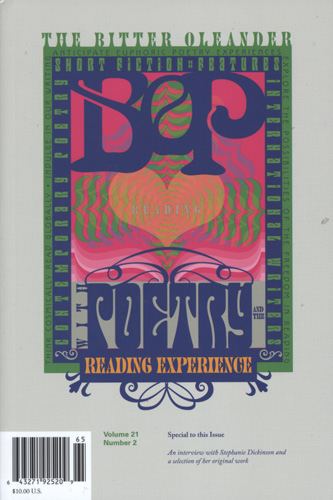The Bitter Oleander – Autumn 2015
The Bitter Oleander’s autumn issue is a motherlode of bold interpretations softened with poems like the delightfully introspective, “I Don’t Want to Write” by Simon Anton Nino Diego Raena. “Leave me alone, please. / All I want is to enjoy the solitude of being / a nonentity in this lightless balcony.” The Bitter Oleander’s autumn issue is a motherlode of bold interpretations softened with poems like the delightfully introspective, “I Don’t Want to Write” by Simon Anton Nino Diego Raena. “Leave me alone, please. / All I want is to enjoy the solitude of being / a nonentity in this lightless balcony.”
In its wake comes another Simon, this one Simon Perchik, who gives us his poem titled “*”. Actually, Perchik, a prolific writer, titles all his poems with an asterisk, and each is generally identified by its first line. In this case, “As if your death is not yet the same weight” is that line.
Numerous poets may have had the coming winter months on their minds. Pierre Voélin’s poem from “In a Hay Meadow,” translated from French by John Taylor, tells us:
But radiate through me come strike in secret
you—the light rumpled by the night
the star greeted by the frost
Rob Cook’s “As Close as that Planet Will Ever Be” uses weather metaphorically: “I feel the bare trees growing in my liver, / The sky there stinks of its continuous drizzle.” Andrea Moorhead incorporates ice and snow in her “Self-Examination” while Patty Dickson Pieczka brings in another element in “Insomniac Visions”: “fog lying dead / in the mulch / of fallen limbs.” It should be noted that Pieczka was the 2012 winner of The Bitter Oleander Press Library of Poetry Award, her skill also shining through in this issue.
Voélin’s poem, mentioned above, is one of a few that defy assignment to a specific category. He follows verse after verse, mostly unpunctuated, with three short paragraphs to wrap up his poem. I’ve noticed more and more writers producing prose poems. They can be found in this and almost every other literary magazine, and I definitely like to read them. However, articles I’ve seen that attempt to define prose poetry seem imprecise, as though I’m not the only one who can’t figure out what distinguishes them from flash prose or even simple paragraphs. Nevertheless, The Bitter Oleander contains some gems that apparently fit the form, enjoyable regardless of what side of the genre fence you’re on.
Several complex works in this issue required rereading to unravel the secrets of their meaning. And even though the intention of the writer is not always clear to me, the words come together nicely. One instance is Indiana poet laureate George Kalamaras’s “If This Bee Body”: “Almost out of nowhere, I am down on all fours again in the uncanny / whisper of a match.” Another example is “Some Lint Did Gather” by John Bradley: “Some claim every egg must leap from a ladder. / In a quiet place, I rested the suitcase filled with sand.”
This volume focuses chiefly on poetry, granting some poets multiple entries, and a hefty portion is devoted to poet and fiction writer Stephanie Dickinson. An interview by The Bitter Oleander editor Paul B. Roth reveals Dickinson’s atypical childhood, details from her life, including a party shooting that ended badly for her, and talk about her work habits and opinions: “Unfortunately, we live in an era that is to a great extent poetry-deaf and literature-blind. Real reading asks—no, demands—that we feel,” she says. “On the street verbalizations seem to have devolved into a series of barks or whinneys [sic] that without the f-word would completely collapse.” Samples from Dickinson’s immense catalog include vignettes on her grandmother’s life and a sequence of short works on the late Austrian poet Georg Trakl, inviting readers in to feel.
A change of pace is provided by an engaging quartet of short fictions. Jill Wright shows us the frustrations of a child forced to endure her mother’s singing lessons. Parents facing a loss is Alain Dougles Park’s subject. The creepy but fun “Love Bites” by Elena Kaufman and Dennis Vickers’ “Ortega’s Circuit” round out the selections.
The Bitter Oleander is designed to be read and revisited. As a bonus, it will challenge you with enough literary artistry to keep your senses alert, and who wouldn’t welcome that.
[www.bitteroleander.com]





